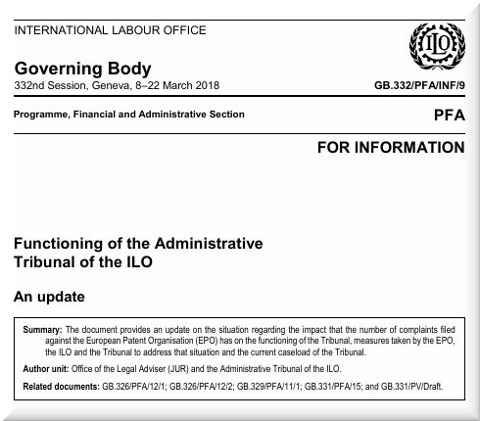Guest article
 Original: March report
Original: March report [PDF]
Summary: Although the non-EPO backlog had been reduced to 84 cases at the end of December 2017, there was an EPO backlog of 155 cases representing 64 per cent of the total backlog
At the 332nd Session of the ILO Governing Body held in Geneva on 8 to 22 March 2018 an update was provided on
"the situation regarding the impact that the number of complaints filed against the European Patent Organisation (EPO) has on the functioning of the Tribunal" and related matters.
According to
the report (document ref no. GB.332/PFA/INF/9):
"[T]he ILO has, over the past few years, devoted considerable attention to addressing the situation arising from the disproportionate number of complaints persistently filed against one single organization", namely the EPO.
In 2015 the Tribunal itself pointed out that the large number of complaints filed against the EPO represented the main challenge to its effective functioning.
The excessively large number of complaints filed against the EPO has been the subject of discussions between the Director-General and the EPO President in one direct meeting and numerous exchanges of letters, and has been regularly followed up by the relevant services of the ILO and the EPO.
The Director-General offered ILO expertise on social dialogue to assist the EPO in the dialogue between the administration and staff union but this was not taken up. (!)
The EPO President claimed that reform efforts have already led to a significant drop in the number of internal appeals, and are expected to result, in due course, in a decrease in the number of complaints lodged with the Tribunal.
The Tribunal confirmed a declining trend in the number of new complaints filed against the EPO whose share of the total number of new complaints filed dropped from 74 per cent at the beginning of 2016 to 39 per cent in 2017.
However, the drop in the number of new complaints is mainly due to the procedural consequences of Judgments 3694, 3785 and 3796 which dealt with the composition of the internal appeals body of the EPO and related matters. The flawed composition of the internal appeals body and other procedural irregularities resulted in the withdrawal of
several hundred final decisions taken by the EPO President and the EPO’s Administrative Council.
This in turn led to the related internal appeals being re-submitted to the EPO’s newly composed internal appeals body where they are currently pending. Consequently, fewer final decisions had been taken by the EPO President, and fewer new complaints were therefore filed with the Tribunal.
The Tribunal also noted that several new complaints challenge the legality of the new composition of the Appeals Committee with respect to the members appointed by the staff and it is committed to examining this issue shortly.
Thus, although decreased, the proportion of EPO-related complaints remains high.
The report notes that the large volume of complaints filed against the EPO cannot be solely attributed to weaknesses in the EPO's internal appeal mechanism but may also be symptomatic of the industrial relations climate within the organization. In this regard, a Memorandum of Understanding (MoU) recognizing trade unions present at the EPO as social partners and creating a collective bargaining framework was signed in March 2016 with one of the staff unions, the European Civil Service Federation (FFPE). However the MoU has not yet been signed by the most representative staff union, the Staff Union of the European Patent Office (SUEPO).
Concerning the Tribunal's backlog of cases, it was noted that although the non-EPO backlog had been reduced to 84 cases at the end of December 2017, there was an EPO backlog of 155 cases representing 64 per cent of the total backlog. Many of the EPO cases are linked and require consideration at the same Tribunal session.
"In order to reduce the EPO backlog more rapidly it would be necessary for entire Tribunal sessions to be devoted exclusively to the EPO."The report states that it is clear that the statistics of the Tribunal are distorted by the EPO cases, either as the “backlog cases” or newly filed cases (for example, one former EPO official filed 97 complaints against the EPO; in October 2015 some 660 complaints were filed against a single decision of the EPO).
In order to reduce the EPO backlog more rapidly it would be necessary for entire Tribunal sessions to be devoted exclusively to the EPO. ⬆

 Original: March report
Original: March report